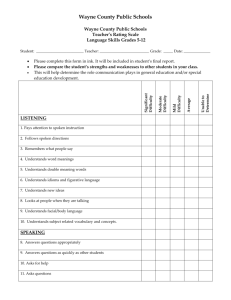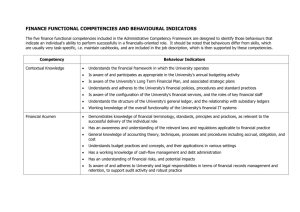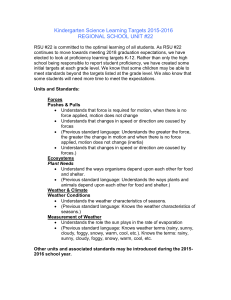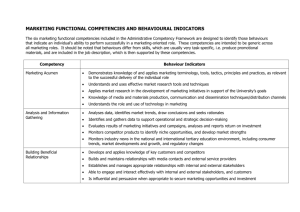Board Competencies (In order of “recruitment” priority) Regulation
advertisement
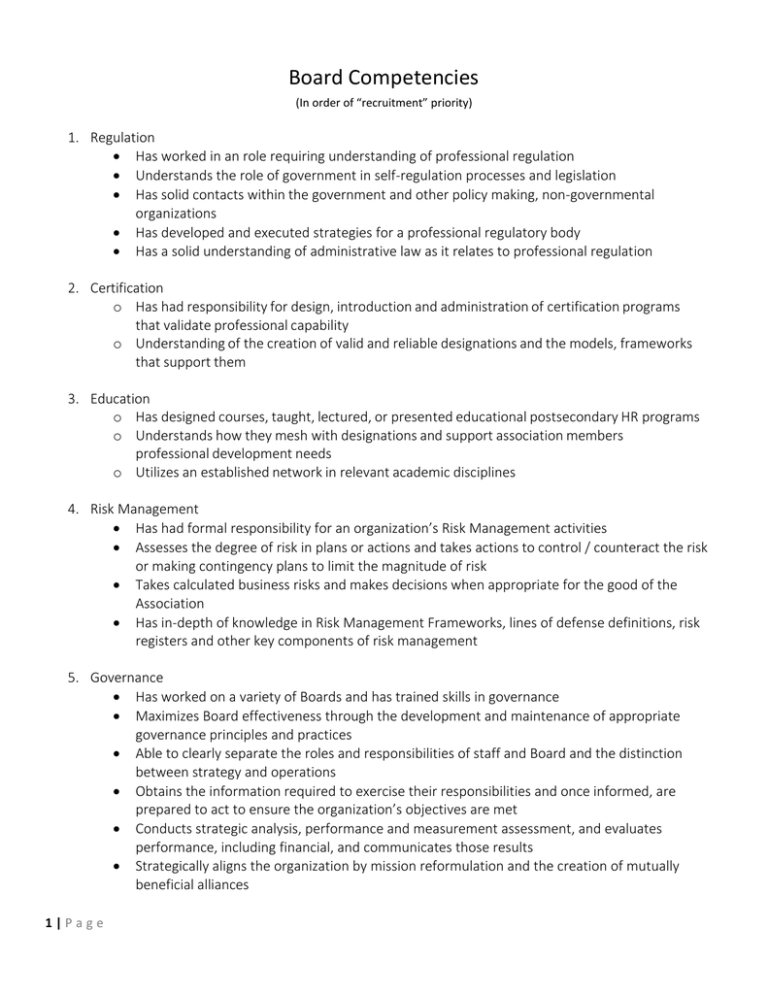
Board Competencies (In order of “recruitment” priority) 1. Regulation Has worked in an role requiring understanding of professional regulation Understands the role of government in self-regulation processes and legislation Has solid contacts within the government and other policy making, non-governmental organizations Has developed and executed strategies for a professional regulatory body Has a solid understanding of administrative law as it relates to professional regulation 2. Certification o Has had responsibility for design, introduction and administration of certification programs that validate professional capability o Understanding of the creation of valid and reliable designations and the models, frameworks that support them 3. Education o Has designed courses, taught, lectured, or presented educational postsecondary HR programs o Understands how they mesh with designations and support association members professional development needs o Utilizes an established network in relevant academic disciplines 4. Risk Management Has had formal responsibility for an organization’s Risk Management activities Assesses the degree of risk in plans or actions and takes actions to control / counteract the risk or making contingency plans to limit the magnitude of risk Takes calculated business risks and makes decisions when appropriate for the good of the Association Has in-depth of knowledge in Risk Management Frameworks, lines of defense definitions, risk registers and other key components of risk management 5. Governance Has worked on a variety of Boards and has trained skills in governance Maximizes Board effectiveness through the development and maintenance of appropriate governance principles and practices Able to clearly separate the roles and responsibilities of staff and Board and the distinction between strategy and operations Obtains the information required to exercise their responsibilities and once informed, are prepared to act to ensure the organization’s objectives are met Conducts strategic analysis, performance and measurement assessment, and evaluates performance, including financial, and communicates those results Strategically aligns the organization by mission reformulation and the creation of mutually beneficial alliances 1|Page Continues to seek feedback and understanding of perceptions, issues or concerns in very emotional or complex situations: “holds a balanced view” 6. Global HR Has worked outside Canada in an HR function A strong grasp of the global economy, international relations and how the two relate to each other A demonstrated ability to function effectively in multi-national and / or international work and related contexts Assimilates comfortably into different worlds / cultures Knows how, and to some extent why, the HR function is practiced as it is in a variety of international contexts Understands the nuances of leading global organizations and the impact of cultural differences on policy, programs and practices Demonstrated ability to influence decisions beyond North America while still understanding the need to think globally but act locally in order to be successful. Has as a minimum lead global teams in multiple countries Has a strategic mindset and the proven ability to apply this across many competencies 7. Human Resources Has run HR function in sizeable organization Excels in formulating organizational goals, and develops strategic HR strategies and policies Excels in training, leading and motivating people Excels in selecting and recruiting the right individuals with the right skills Develops and administers training and development programs that will improve the skills of professionals Establishes clear and meaningful criteria or standards for effective performance and compensation management Excels in developing career paths, and plans and administers effective career development 8. Legal Familiar with and has functioned within the full range of employment legislation Understands and applies relevant legislation and jurisprudence as it relates to business issues, in addition to Canadian human resources and / or labour law Is comfortable with applying legal expertise in non-routine situations and demonstrates a personal motivation to expand and share their knowledge / expertise 9. Financial Literacy Has held a senior financial role in an organization and/or an accounting designation Fully comfortable with the financial statements (income, balance sheets, cash flows) of the association and the implications of their results for survival and future success Takes a business owners perspective of the organization, i.e. sees the big picture Anticipates the financial impact of trends on the organization and its customers 2|Page Devises multiple, linked actions which position the organization for ongoing growth, member satisfaction and financial viability Sets future goals to meet financial and operational targets (i.e., membership, profit/loss, ROA, ROE, ROI, or growth). Recognizes the need to disinvest in a situation, has insight and appreciation of member needs, priorities, goals, competitive advantage, and seeing that all controllable factors support member service, profitability and growth objectives 10. Advocacy Has worked in a role where lobbying policy makers and advocacy have been an important part of the position Is confident and has strong public speaking skills Is knowledgeable of the issues both internally and externally, appears trustworthy and able to represent the associations plans and policies in any discussions Is willing to put self in challenging situations or confront stakeholders with difficult issues and "go out on a limb" when doing so is critical to the organization's success Knows both the formal and informal norms and procedures and works to change them in order to achieve long-term benefits for the Association and its members Understands and has strong links with government and non-government agencies that are important to HRPA 11. Marketing Has worked in a marketing capacity or held a senior HR role in a marketing firm, market research organization or ad agency Has a broad network in and outside the profession for effective promotion of of the Association’s plans, direction and strategies Displays intellectual curiosity and takes the initiative to look beyond the immediate environment, recognizing subtle patterns and synthesizing an informed perspective on existing or emerging member benefits / products / services 12. Communications Excels in effective and positive communications, particularly the ability to accurately listen, understand, and then respond appropriately when interacting with individuals and groups Acts as ambassador by delivering positive messages about the association in all forums and discussions Sets and manages high standards for including others and encourages open dialogue 13. HR Research Has worked in a research role in academia or in an organization designing, conducting and analyzing HR related surveys Understands and makes judgments about a situation by breaking it apart into smaller pieces, or tracing the implications of a situation in a step-by-step manner Identifies key relationships, diagnosing opportunities, organizing the parts of a problem or situation in a systematic way 3|Page Sets priorities on a rational basis, including: identifying time sequences, causal relationships or If- Then relationships Synthesizes and looks at component parts in the context of a whole system Improves performance by doing things that are unique, leading-edge or new, or newly applied 14. Strategic Alliances Has developed sustainable and evolving strategic alliances and partnerships for mutual benefit Has hands-on experience in mergers, acquisitions and/or significant strategic alliances Creates new concepts, models and strategic alliances / partnerships that are not obvious to others prior to their creation Generates and tests multiple concepts, hypotheses or possible explanations for potential constructs as they relate to long-term organizational and member professional performance Has understanding of investment markets to ensure effective oversight of the association’s financial reserve 4|Page
